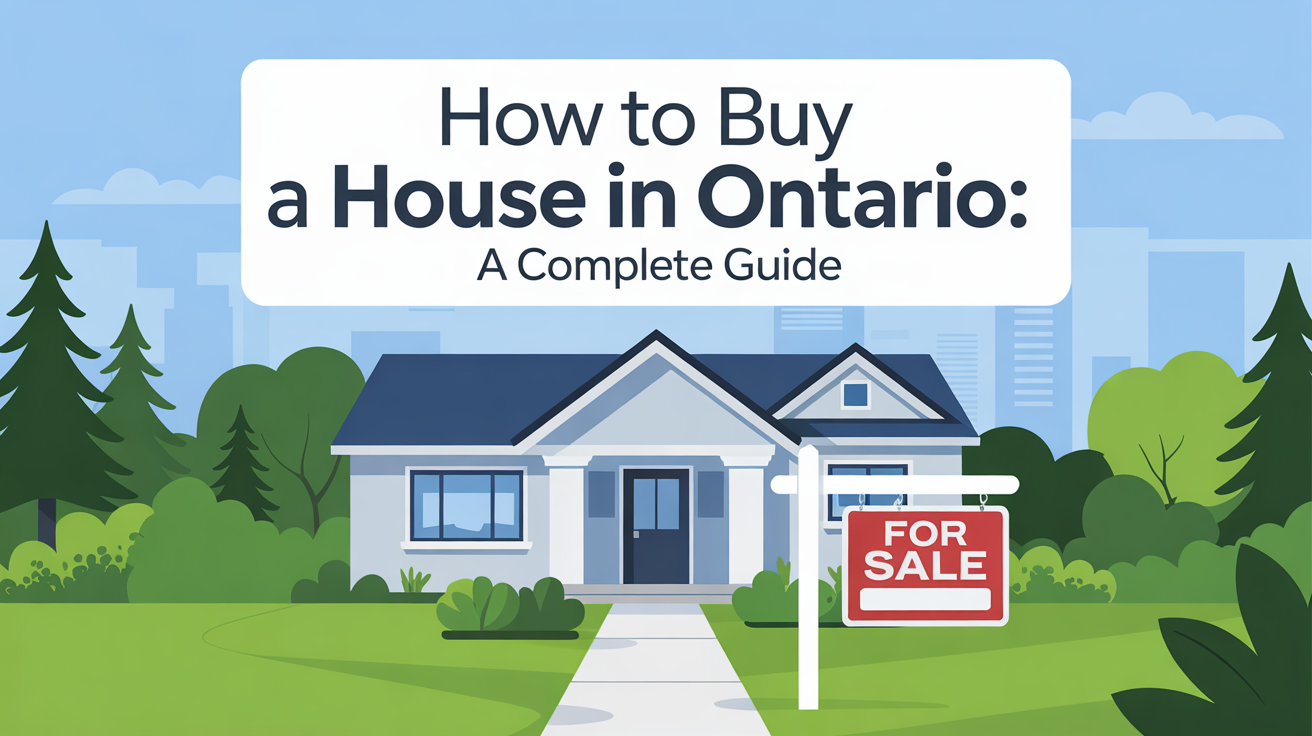
- Tajinder Kaur Sivia
- 04-Apr-2025
Buying a house in Ontario is an exciting but complex process. It requires financial planning, research, and the right professionals to guide you. Whether you are a first-time buyer or an experienced investor, understanding the steps involved will make your home purchase smoother. This guide will take you through every stage of buying a house in Ontario, from budgeting to closing the deal.
Determining Your Affordability
Understanding your budget is the first step to buying a house. Prices in Ontario’s real estate market are set based on competition between locations. You should know your financial situation before you start looking at properties. Look at your savings, monthly income, debts, and expenses.
Mortgage affordability calculators can assist you in estimating what you can afford. Income, credit score, and debt-to-income ratio will be accounted for by lenders. With a higher credit score comes a better mortgage rate.
You will need a down payment in Ontario. The percentage varies by the price of the home. For houses under $500,000, it is 5%. However, for homes priced under $500,000, you will only need 5% on the first $500,000 and 10%, for everything above that. The minimum down payment in such cases is 20%.
Saving for a down payment is time consuming. Savings, purchases from family, or the government’s First Time Home Buyer Incentive are used by many buyers. You plan to make sure you will have enough funds.
Engaging a Qualified Realtor
Buying a house without a real estate agent is a struggle. They understand the market, negotiate prices, and do the paperwork. A good agent can locate the right home for you and assist you with the process.
Instead of going to various agents, it would be best if you look for an agent that specializes in the area where you want to buy. Make sure you research the agent you are selecting, request referrals, and also check on online reviews. You can meet several agents beforehand and ultimately make the right decision.
Listings come out before they become public. What that does is allow them to also identify what potential problems they might have on a property. A capable agent will see to it that you save time and money.
Obtaining Mortgage Pre-Approval
Pre-approval for a mortgage is critical. It gives you a feeling of how much the lender is willing to lend you. This helps narrow your home search and shows sellers you are a serious buyer.
The only way to get pre-approved is to provide some financial documents. Lenders will look at your income, employment history, credit score, and debts you already have. Having a pre-approval letter from a lender gives you that strength in the market.
Mortgage rates in Ontario vary. Both fixed-rate mortgages are stable while variable-rate mortgages fluctuate in a market setting. Compare rates and seek out the best option with a mortgage broker.
Understanding Closing Costs
Many buyers focus on the purchase price but forget about closing costs. These additional expenses can add thousands of dollars to your home purchase.
Closing costs in Ontario include:
- Land Transfer Tax: This tax varies based on the property’s price. First-time buyers may qualify for a rebate.
- Legal Fees: A real estate lawyer handles the paperwork and ensures the transaction is legally sound.
- Home Inspection Fees : A home inspection checks for hidden issues before you buy.
- Appraisal Fees: Lenders may require an appraisal to determine the property’s value.
- Title Insurance: Protects you from potential title disputes.
- Property Tax Adjustments: If the seller has prepaid taxes, you must reimburse them.
Budgeting for closing costs will prevent surprises on closing day.
Hiring a Real Estate Lawyer
If you want to make a smooth transaction then you by default need a real estate lawyer. These include contractual reviews, title searches, legal paperwork, etc. To purchase a home you need a lawyer in Ontario.
Your lawyer will look for any outstanding debts on the property, check ownership, and register in your name. In addition, they would also ensure that there is no violation of any legal requirements. The legal fees are between $1,500 to $2,500 depending on the complexity of the case.
Mortgage documents are also reviewed by a real estate lawyer to make sure that there are no hidden terms that could work against you. This way they can find out whether there are easements or encroachments on the property that may limit what you can do with the land.
Exploring the Real Estate Market
The real estate market in Ontario differs from location to location. In Toronto and Ottawa, the prices are higher than they are in other places. Explore various research and look for a neighborhood that you can afford and live in.
For instance, consider the schools, the public transit, the crime rates, and the future developments. Go visit neighborhoods at different times of the day to feel the community.
You can use online listings and open houses to learn about the market. They can also give you tips on price trends and potential investments. Check also local economic factors such as job growth, planned infrastructure projects, and property appreciation rates. Better long-term value can be found in an area with new developments that are growing.
So check if your lifestyle needs such as the presence of parks, restaurants, and healthcare facilities exist within the neighborhood. A good location can improve your quality of life and increase the resale value of your property in the future.
Making an Offer
Once you find the right house, it’s time to make an offer. Your real estate agent will help you draft a formal purchase offer. The offer includes:
- The purchase price
- The deposit amount
- Conditions (e.g., financing, home inspection)
- The closing date
Your offer may be accepted, rejected, or countered. Be prepared for negotiations. Your agent can advise you to make strategic adjustments and ultimately reach an agreement. It takes time to negotiate a business sale and there will probably be counteroffers multiple times until both sides agree to the terms of the agreed price.
Be flexible but not too flexible and stay within your budget. Don’t give up if the seller refuses your offer. And there's always something available in other homes, so hang in there, and good things will come to you, and you will find the home you want at the price you are willing to pay.
Also Read: - Does a rebuilt title affect insurance in ontario
Finalizing the Mortgage and Home Inspection
Before closing, finalize your mortgage. The final review is done by your lender and they issue a mortgage commitment. Read and understand the terms that include interest rate and payment schedules. Pay close attention to the small print so that there are no surprises after.
A home inspection is a must. It shows potential trouble such as foundation problems, leaks in plumbing or in the roof. You can renegotiate or walk away from the deal should major problems arise. A complete check protects against future heavy bills.
Specialized inspections for pests, mold, or radon are elected by some buyers. The investment in a detailed inspection now can mean saving thousands of dollars later. Symptom: The results of the inspection should always be discussed with your agent and lawyer.
Closing the Deal
Closing is the final step. Your lawyer will complete the legal paperwork, transfer funds, and register the property in your name.
On closing day, you will:
- Pay the remaining balance
- Cover closing costs
- Sign legal documents
- Receive the keys to your new home
They will see to it that the title is clear and that the exchange of money is appropriate. You are now the actual owner of the house once the transaction is done. While it may sound confusing, careful planning and the expert help of an attorney will minimize the complexity. Sign all documents and check twice all before signing, and keep a record copy of everything. So, check to ensure that all utilities, home insurance, and property taxes are transferred under your name immediately.
Also Read: - Common law canada requirements
Moving In and Settling Down
During the process of closing, moving in, and starting to plan your move by hiring movers, moving your belongings, changing utilities, and changing your address. Make connections with neighbors and become acquainted with your new community. Start by setting up basic services like internet and security systems and take a little time to sort out the home efficiently.
Owning a home is a responsibility. Maintain a budget for property taxes, maintenance and repairs. Keeping it up regularly will protect your investment and increase your home’s value. If you do not have an emergency fund to cover the unexpected repairs like plumbing problems or roof leaks, you might want to set one up. Taking care of your property will help you enjoy it for years to come and homeownership is a long term commitment. Welcome to your new home!
Final Thoughts
Purchasing a home in Ontario is a piece of cake. This is a process, and it includes financial planning, legal steps, and market research. Click on the journey with confidence and follow these steps.
Seek advice from experts, keep yourself aware of market developments, and be ready for unforeseen costs. Finding a home that fits your budget and needs with the right approach will be possible.
When you trust HouseClosing.ca for professional legal support you know to expect a smooth and stress free process. The experienced team at HouseClosing.ca provides buying, selling and refinancing properties with the help of their personalized services. Get in contact with us today to be helped out there on your real estate transactions.
Start your home-buying journey today and take the first step toward owning a property in Ontario!


